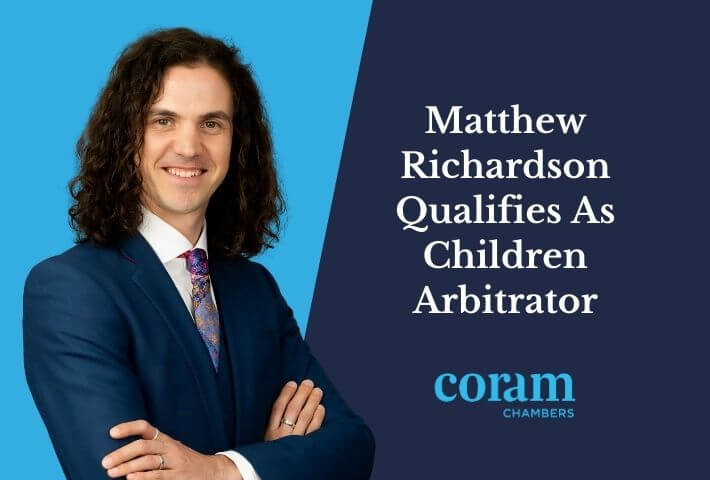Three members of chambers (Mark Twomey KC, Alison Easton and Nicholas O’Brien) were involved in a Court of Appeal case earlier this week regarding long-term use of section 20 voluntary accommodation
The Court of Appeal has handed down its judgment in Re S (a child) and Re W (a child) [2023] EWCA Civ 1. In Re S, Mark Twomey KC was counsel for the respondent local authority. In Re W, Alison Easton was counsel for the appellant parents (and acted pro bono) and Nicholas O’Brien was counsel for the respondent local authority. Both appeals were allowed. The judgment was given by King LJ; Arnold and Warby LJJ concurred.
The appeals concerned the interplay between care orders and the voluntary accommodation of children under section 20 CA 1989. The issue was whether and in what circumstances, if the threshold criteria for making a care or supervision order in s 31(2) are met and there is in place an agreed care plan for the child to live in accommodation provided by the local authority, the court should decline to make a care order and instead make no order pursuant to s 1(5) CA 1989. Both sets of appellants contended it was appropriate to accommodate their children on a long-term basis under section 20. Case law to date has focused on section 20 accommodation as a short-term or temporary solution.
Both cases related to children who were suffering or risk of suffering harm by reason of being beyond parental control and were settled in long-term placements which were meeting their respective needs, in circumstances where the placements and care plans (but not care orders) were supported by the parents.
The court’s analysis of the law
King LJ explored the differences in law between care orders and section 20 accommodation (para [38]). Care orders grant local authorities parental responsibility (s 33(3)(a) CA 1989) and the power to determine the extent to which a parent may meet their parental responsibility for a child (s 33(3)(b)(i) CA 1989). A local authority with a care order can therefore ‘trump’ the parents whenever there is a disagreement about a child’s care. By contrast, local authorities do not acquire parental responsibility under section 20.
King LJ outlined the parameters of section 20 accommodation at para [45]:
There is no statutory limit on how long a child can be in section 20 accommodation.
- A local authority cannot provide accommodation under section 20 if any person with parental responsibility, who can provide or arrange for accommodation to be provided for the child, objects (s 20(7) CA 1989).
- By agreeing to the accommodation of their child under section 20, a parent is delegating parental responsibility to make day-to-day decisions to the local authority.
- Any person with parental responsibility may remove a child at any time from the accommodation (s 20(8) CA 1989).
- If there is a child arrangements order naming a person with whom the child is to live and that person agrees to the child being accommodated under section 20, no other person with parental responsibility may object or remove the child (s 20(9) CA 1989).
If threshold is crossed (s 31(2) CA 1989), in deciding whether to make a care order the welfare principle applies and the court must have regard to the welfare checklist (s 1(3) CA 1989). In order to be a proportionate interference with a child and a parents’ Article 8 rights to a family life, a care order should only be made if it is the least interventionist order possible (see Re H-W (Children) [2022] UKSC 1451, para [45]).
King LJ explored the leading authority on section 20 accommodation: Williams v London Borough of Hackney [2018] UKSC 37. Lady Hale recognised therein the emphasis in Part III Children Act 1989 (which includes section 20 accommodation) on partnership between parents and local authorities in making decisions about children.
King LJ also considered the report of the President’s Public Law Working Group (‘PLWG’) and its Best Practice Guidance on section 20 accommodation (paras [56] to [61]). The report recommended there should be no time limits on section 20 accommodation, but where possible the purpose and duration of any such accommodation should be agreed at the outset and regularly reviewed.
At para [62], King LJ concluded:
For my part, I can see no inhibition on a section 20 order being made in appropriate circumstances for a longer period of accommodation provided that proper consideration is given to the purpose of the accommodation and that the regular mandatory reviews are carried out.
Moreover, King LJ decided, in light of Williams v Hackney and the PLWG’s guidance, that further judicial guidance from the Court of Appeal on the proper use of section 20 would serve little purpose (para [63]).
The appeals
Turning to the appeals under consideration, with respect to Re S the court concluded that granting a care order was not a proportionate response to an unsubstantiated future risk that the child’s father might disrupt the placement and remove the child from the accommodation (paras [65] to [70]). While S’s father could, in law, remove the child, there was insufficient evidence he would. King LJ also noted her ‘preliminary view’ that a ‘lives with’ order could be made in favour of one parent with respect to a child already in section 20 accommodation, to prevent another parent removing the child (section 20(9) CA 1989).
Regarding Re W, the court found that the trial judge had erred in believing that section 20 accommodation could only be a short-term measure (para [74]) which disproportionately weighted her analysis in favour of a care order. Further, in any case it was disproportionate to make a care order primarily to grant the local authority parental responsibility as a means of setting boundaries and responding to a mere risk that the child would develop challenging behaviour in future (paras [77] to [78]).
Re S and Re W is an important case, highlighting that voluntary accommodation of children under section 20 CA 1989 can be a long-term measure, and reinforcing the need to safeguard against disproportionate state interference in family life in the form of unnecessary care orders.
Written by Rob Marsh (Pupil barrister)


